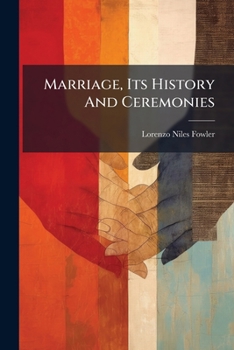Marriage, Its History And Ceremonies
Select Format
Select Condition 
Book Overview
"Marriage, Its History And Ceremonies" by Lorenzo Niles Fowler explores the historical and social dimensions of marriage, offering a fascinating glimpse into the customs and traditions surrounding this fundamental institution. With the subtitle "With A Phrenological And Physiological Exposition Of The Functions And Qualifications For Happy Marriages," the book delves into now-discredited but then-popular theories of phrenology to offer insights into compatibility and marital success.
This work provides a unique perspective on Victorian-era attitudes toward marriage, examining its significance in society and the perceived roles of men and women. Fowler's examination extends beyond mere historical recounting, venturing into contemporary understandings of physiology and social dynamics. "Marriage, Its History And Ceremonies" serves as both a historical document and a reflection on evolving cultural norms surrounding marriage, making it a valuable resource for those interested in social history and the changing landscape of human relationships.
This work has been selected by scholars as being culturally important, and is part of the knowledge base of civilization as we know it. This work was reproduced from the original artifact, and remains as true to the original work as possible. Therefore, you will see the original copyright references, library stamps (as most of these works have been housed in our most important libraries around the world), and other notations in the work.
This work is in the public domain in the United States of America, and possibly other nations. Within the United States, you may freely copy and distribute this work, as no entity (individual or corporate) has a copyright on the body of the work.
As a reproduction of a historical artifact, this work may contain missing or blurred pages, poor pictures, errant marks, etc. Scholars believe, and we concur, that this work is important enough to be preserved, reproduced, and made generally available to the public. We appreciate your support of the preservation process, and thank you for being an important part of keeping this knowledge alive and relevant.





